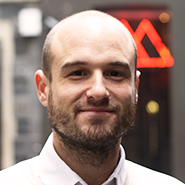Why Serial is nothing more than just a good story

Hear me out. Serial, the innovative podcast that drew in millions of listeners for 12 weeks, is nothing more than just good storytelling.
Why just? Because it’s actually, dare I say it, bad journalism.
Woah, stop, hands off the comment button for a few more minutes. Let me tell you why.
• Landmark podcast Serial crowdfunds a second serve
• Serial: the gripping podcast everyone is talking about
I’m like you, I devoured Serial. I wanted to know the real-life crime story of who killed Baltimore teen Hae Min Lee in 1999.
Presenter Sarah Koenig skillfully introduced me to the small galaxy of suspects and witnesses and investigators as she also bared her personality.
More like Bob Dylan’s song Hurricane, Serial‘s approach can’t be considered traditional journalism. It’s made to draw attention to an injustice, and quantitatively did so, to bring a reinvestigation of the case.

Narrator Sarah Koenig. Photo: Serial
But it’s also a collaborative public exposition the sort we only ever hear about in journalism academia as an ideal; let me call it ‘Folk Journalism’ – and that part definitely needs a fine tune.
In what became the most popular podcast in the United States, Koenig laid out the implausible case put to two juries that ultimately jailed Lee’s ex-boyfriend Adnan Syed, then 17 years old, for life.
Syed still professes his innocence, and lawyers experienced in assessing innocence after sentencing like The Innocence Project’s Deirdre Enright, interviewed for the show were convinced to take on Syed’s case.
The nature of the project: journalists reviving a cold case 15 years after the fact, had its challenges. Foggy memories, conflicting recalls, evidence disappearing since the act, all these things happened.
We learn early on that Lee’s body was missing for about three weeks, making alibis also hard to pin down.
Serial‘s task wasn’t easy by any stretch. The team worked for 15 months to produce 12 hour-long episodes which meant finding every scrap of paper presented to the courts, combing through recordings of witnesses and revisiting unhelpful ones without the coercive powers of the police. They did the legwork, no question.
And given the nature of the series, being made and posted weekly, new voices came out of the woodwork as more information was made public. The downside to that is Serial took on the air of an internet forum, where a question is posted asking for a reasonable answer and generates pages of discussion.
But over the series we turn over the facts and hear the rumours, claims we thought were rock-solid are queried and debunked later on.

Convicted murderer Adnan Syed is the unlikely star of Serial‘s first season.
Australian veteran radio journalist Mark Colvin, who made sharp documentaries for TV and radio throughout his career, said the format was “brave” and he found it compulsive listening but “it’s a ramble rather than a purposeful narrative”.
He said had he been involved he would have “insisted” each episode begins by asking whether the authorities had proven Syed’s guilt beyond reasonable doubt.
If the aim was to investigate Syed’s guilt (and there was a definite undercurrent pointing at least to the case against Syed being flimsy) a journalist needs to filter out the extraneous voices to present the case clearly.
Here comes a spoiler. We still don’t know who killed Hae Min Lee, and by the final episode Koenig has sprayed a dose of suspicion on a dead ex-convict, Ronald Lee Moore, who was out of jail and around Baltimore at the time Lee died. Moore is a person who appeared to Koenig in the final week.
The series lost its way, clouded by the journalistic curse of doubting itself, and we already knew the case should have ended in Syed’s acquittal early in the series.
Serial didn’t expel doubt, it shifted it to a hypothetical. That’s not what good journalism does, but if it brings out new evidence then it has enjoyed success that is greater than mere popularity.








